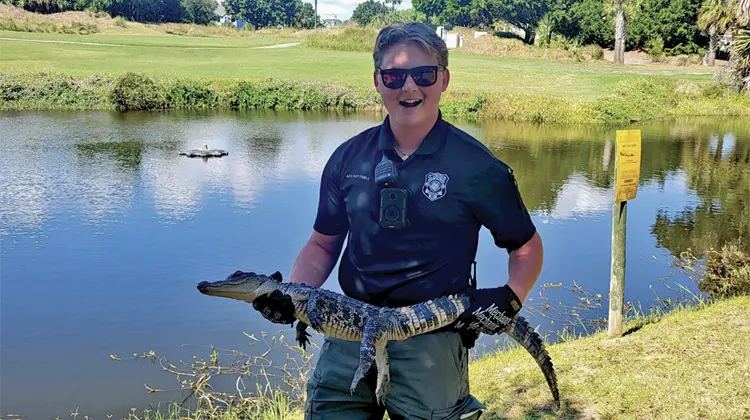
The next time you spot wayward coyotes, lost turtles, sick pelicans, itinerant raccoons, roaming dogs or any other animal species or wildlife on Isle of Palms, chances are that IOP Police Department’s Animal Control Officer Sean Kittrell will be on the case.
Kittrell recently became the island’s newest animal control officer, responsible for keeping the island’s growing number of animals under control for the safety of all island residents and visitors – and he wouldn’t have it any other way.
“I have always had an interest in working with animals,” said Kittrell, who has been with IOPPD less than two years. “I was fortunate enough to grow up in Charleston and have spent a lot of time here and on Goat Island, so I was already very familiar with the wildlife on Isle of Palms and I didn’t want to miss this opportunity.”
Kittrell’s interest was also fueled by his previous position. Upon joining IOPPD in the spring of 2023, he became a beach service officer, which allowed him to see up close how an animal control officer handled day-to-day workings and routine, a job with increased demand as the island becomes more populous with residents, visitors and animals.
For example, last year there were 61 beach coyote sightings reported. This past September, the IOP City Council approved an ordinance on second reading prohibiting the feeding of wildlife, except for feral cats and birds. The main issue discussed at the meeting centered on how intentional feeding of wildlife can lead to increased human-wildlife conflicts and the spread of disease and encourages concentration and growth of animals in urbanized areas, which can pose a hazard to humans, pets and plant life.
“Our animal control officer has played an important role in our community,” said IOPPD Police Chief Kevin Cornett during the hiring process. “Because most people do not realize that this island is home for a lot of different types of animals and some that are considered endangered.”
Kittrell’s duties include:
- Responding to calls for injured wild animals/birds
- Responding to calls about alligators that have wandered into dangerous locations
- Assisting with sea turtle activity
- Helping protect endangered birds that nest on the beaches
- Enforcing leash laws
- Rescuing animals that have washed up on land or have become beached
- Transporting stray animals to an appropriate facility
- Reporting animal bites and suspected diseased animals to appropriate health officials
- Educating residents about how to handle situations involving exotic animals such as coyotes, which have become a growing island concern
“We have seen an increase in coyote activity this year and have been working to find ways to best address the issues surrounding them,” Cornett said.
Kittrell added that wildlife issues tend to “follow the seasons.” He pointed out, for instance, that coyotes, which have become a much bigger concern in recent years for both residents and visitors, will increase in number and be far more active and protective of their dens in the late winter and springtime during mating season, “which is when we usually have the most frequent problems with them.”
In the fall and the waning months of summer, many barrier islands and coastal communities such as IOP will see a lot of first-year pelicans get sick and weak “as some of them never learned how to fish properly on their own.”
Raccoons, a usual menace to neighborhoods, are now also a health concern. “We’re focused primarily on preventing and stopping any possible outbreaks of distemper or rabies,” Kittrell said.
But when asked to name the island’s most pressing animal concern, Kittrell said dogs, by far. “We always want to remind our residents and visitors to have their dog on a leash,” he said, “unless they are observing the off-leash hours on the beach.”
Kittrell added that while there aren’t a lot of distinctive measures to implement without disrupting the island’s ecosystem and natural wildlife habitats, residents with any animal concern always have the option to contact Kittrell to help keep them safe and to keep the right balance between humans and animals.
“Going forward, I want to prioritize building a relationship with the community that we have on Isle of Palms,” Kittrell said. “My door is always open and I want to be there to assist with any and all animal calls.”
LEASH LAWS ON IOP
When can dogs be on the beach off leash?
- Dogs are allowed to be off-leash on the beach from April 1 through Sept. 14 from 5 a.m. until 9 a.m. and Sept. 15 through March 31 from 4 p.m. until 10 a.m.
- Dog owners must have a leash in hand, have their dog under voice command and must clean up excrement. There are dog bag receptacles at most of the public beach access paths.
At all other times, dogs must be on leash and under complete control, even in the water. Please follow these rules to make sure that your pet is safe and that you are ticket-free.
DOG PERMITS
- All dogs that live or visit the City must be vaccinated against rabies and have a metal license tag attached to its collar with the name of the licensed veterinarian who provided the vaccine. Dog owners must also have a valid certificate of rabies vaccination readily available at all times. Residents are encouraged to obtain a dog permit from the Isle of Palms Police Department.
- Dog permits will be issued annually and are free of charge. Having a dog permit may facilitate the safe return of lost dogs.
Ordinances are enforced by the Isle of Palms Police Department. The non-emergency number is (843) 886-6522. For more information, visit iop.net.
By L. C. Leach III




Leave a Reply